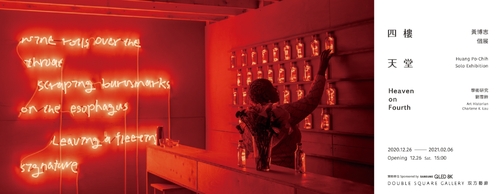Heaven on Fourth
12/26/2020 (Sat) - 2/6/2021 (Sat)
Huang Po-Chih

Art Historian|Charlene K. Lau
Opening reception|2020.12.26 (Sat.) 15.00
Exhibition dates|2020.12.26-2021.02.06
Exhibition venue|Double Square Gallery
Performa commission, co-commissioned with Taipei Fine Arts Museum for the Performa 19 Biennial
The “Light Year Project,” a collaboration between Double Square Gallery and Samsung, is delighted to present Heaven on Fourth—HUANG Po-Chih Solo Exhibition, which runs from December 26, 2020 to February 6, 2021. Heaven on Fourth, the namesake of the exhibition, is Huang’s latest work that combines the element of live performance. A 2019 co-commission by Taipei Fine Arts Museum and Performa 19 in New York, the work made its debuted in Performa 19 and was later showcased in Busan Biennale 2020; and it is now presented in Taiwan for the first time. The exhibition at the gallery features a video installation combined with manuscripts and publication, and specially invites art historian and curator Charlene K. Lau, who participated in the preproduction of Heaven on Fourth, to reflect on the work and contribute her thoughts.
Heaven on Fourth was adapted from a real case that took place in New York’s Flushing in 2017. A Chinese illegal immigrant sex worker Song Yang fell to her death from the fourth floor following a police sex-trafficking raid. Song used to work in a sweatshop that produced garments in Saipan. Due to the decline of the garment industry, she moved with her husband, who was an American citizen forty years older than her, to Flushing, New York, hoping to have a fresh start. However, because of her husband’s advanced age and her identity as an illegal immigrant, Song could only work as a sex worker in an illicit massage parlor to sustain their livelihood. After her death, the apartment she rented was leased again to become a store ironically named “Heaven on Fourth.” Song’s death exposed the dark life of lower-class immigrants in America; and her case has also put much political pressure on the New York City Government’s handling of issues related to illegal massage parlors and sex-trafficking, flushing out more previously unnoticed and undealt problems. Song’s life story was extensively covered by The New York Times. However, as time has passed, her multiple identities as a member of the racial and ethnic minority, immigrant and sex worker communities, her story as well as her death have all become a common part of the listless life and gradually faded into a haze.
Heaven on Fourth was a site-specific performance originally staged in a temporary structure that looked like a two-story bar named “Heaven on Fourth.” In the performance, the actors read personal stories reconstructed by Huang and four other writers (three Asian-American writers and one Taiwanese playwright) in a simple, unadorned manner. These stories are as much about Song Yang as they are about every similar yet different “women” in countless corners in this real world—the narratives interlaced with fiction and facts might perhaps hinder the audience’s to understand the truth; the parts of cocktail making woven into the performance might immerse the audience in dream-like readings; and perhaps the audience’s silence might simply be a side effect of the flooding red neon light. Regardless, Heaven on Fourth welcomes you to enter the imagination and dilemmas presented by the artist and the writers as their responses to reality as well as the multiple narratives interwoven with news events and historical texts.